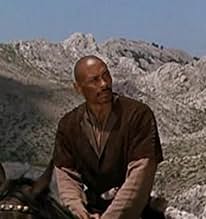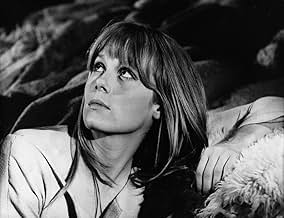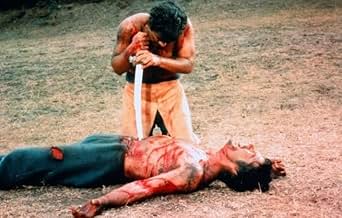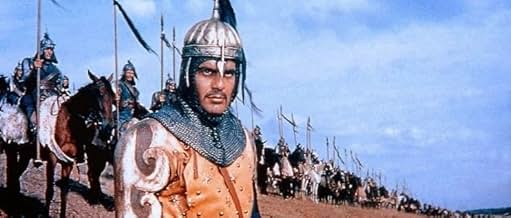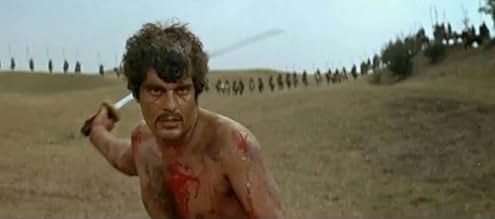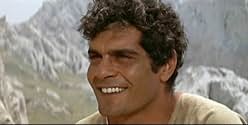Genghis Khan
NOTE IMDb
5,8/10
2,7 k
MA NOTE
Ajouter une intrigue dans votre langueDuring the thirteenth century, the shy Mongol boy Temujin becomes the fearless leader Genghis Khan, who unites all Mongol tribes and conquers most of Asia, Europe, and the Middle East.During the thirteenth century, the shy Mongol boy Temujin becomes the fearless leader Genghis Khan, who unites all Mongol tribes and conquers most of Asia, Europe, and the Middle East.During the thirteenth century, the shy Mongol boy Temujin becomes the fearless leader Genghis Khan, who unites all Mongol tribes and conquers most of Asia, Europe, and the Middle East.
- Réalisation
- Scénario
- Casting principal
Françoise Dorléac
- Bortei
- (as Francoise Dorleac)
Susanne Hsiao
- Chin Yu
- (as Suzanne Hsaio)
Avis à la une
I haven't seen this in years, but I remember it has some exciting battles, some good acting by Omar Sharif, Michael Hordern and Stephen Boyd, some great acting by James Mason and Robert Morley. I guessing that none of the actors were Mongolian or Chinese. Historically inaccurate, but kind of fun, sort of like some of Erroll Flynn's movies, like "The Charge of the Light Brigade". In recorded history, Genghis Khan was a murderous, merciless tyrant, not the idealist he's seen as in this picture, just wanting to unite all the tribes and live their lives out riding around on their horses not being bothered by the meddling Chinese. Even with all that said, it has some spectacular action and some interesting scenes that do have some historical veracity.
This has about as much to do with the real Genghis Khan as the Hughes film"The Conquerer".If you want to know about the real historical figure,read Lamb's 1920s book.That aside,we have to appreciate the production values of the film.Sets,props,etc.,are all ok.None of these people,however,can scarcely be imagined as Central Asians.Greek Savalas and Alabaman Strode come closest.Wallach,as the Shah,makes an acceptable sly villain,and not an unbelievable Levantine.Everybody else is not only much too European,but much too Nordic,as well.(Sharif is only a minor exception to this generalisation.)And Morley,Mason,and Hordern all act as though they wandered in from a road company of "The Mikado".Watch this film for amusement,and perhaps free-wheeling historical fiction(aka Robert E. Howard),but don't take it too seriously.
This is a biopic of Temujin (Carlo Cura/Omar Sharif). This starts with the massacre of his tribe and being taken captive. He would escape and slowly rebuild his tribe. His shaman explains that there are three circles. Their middle circle is full of poor fighting tribes while the Chinese and the white Westerners are rich in the two outer circles. He would conquer the whole Mongolian steppe and meet the Chinese emperor.
This is an old Hollywood epic. It follows the tradition of western actors playing Asian characters. I don't expect any better but it is still very old fashion and dated. The story is fictional, but to be fair, the actual history is mostly written legends and oral traditions. The story does lose steam over time. There is no criticizing the caliber of the cast despite their incorrect race. It's all very grand and very old.
This is an old Hollywood epic. It follows the tradition of western actors playing Asian characters. I don't expect any better but it is still very old fashion and dated. The story is fictional, but to be fair, the actual history is mostly written legends and oral traditions. The story does lose steam over time. There is no criticizing the caliber of the cast despite their incorrect race. It's all very grand and very old.
I have to admit I didn't think this film was half as bad as I have been led to believe through negative reviews here on IMdB and elsewhere. So, if it isn't all bad ... I agree it isn't historically accurate but neither was Elizabeth and 100s of other 'historical' films. It is a bit leaden in places, true. Francoise Dorleac gets a bit tiresome although even she has her moments. The script may be a bit dodgy in places but looking at what we get in recent years ... I don't have a problem with Sharif in the title role at all - I thought he was fine. The 'Chinese' being Mason and Morley was distracting but even at their worst these two were always entertaining. Eli Wallach and Michael Hordern make interesting appearances. Even done on the cheap the film doesn't look bad and I enjoyed it better than, say, Demetrius and the Gladiators. And then there was cute Stephen Boyd if all else failed, always a pleasure to watch. Genghis Khan a turkey? Let's just say 'I've seen worse'.
As an user has pointed out ,this is the last of the spectaculars of the late fifties/early sixties which began with De Mille's "Ten Commandments" and included such works as "Ben Hur" ,"Spartacus " (which was more Kirk Douglas' work than Kubrik's ),the highly underrated "Cleopatra"(when will we see the uncut version?),Mann 's "El Cid" and "Fall of the Roman Empire" .
This is the last hurrah,but it's a bad film.James Mason and Robert Morley do not seem to take their roles seriously (as Chinese characters!!)and their playing is deliciously tongue-in-cheek.But all the others seem to believe in this far-fetched tale ,very dubious historically ,with Egyptian Omar Sharif as the lead who abducts pretty princess (French Françoise Dorléac) who is raped by Irish Villain (even
nastier than Ben Hur's Messala) Boyd.There's also American Wallach who offers him his two daughters.Both Sharif and Boyd seem to enjoy bondage (collar ,cage,etc).When he speaks to common women ,Genghis is feminist (it's up to them to choose) ,but when he is with his wife ,he's a more credible macho.
Incidentally,Sharif,Mason and Dorléac's sister (Catherine Deneuve) would team up three years later in Terence Young's "Mayerling".This time,Mason was Sharif's father .
If you want to see a good Sharif movie,do choose "Dr Zhivago" instead.
This is the last hurrah,but it's a bad film.James Mason and Robert Morley do not seem to take their roles seriously (as Chinese characters!!)and their playing is deliciously tongue-in-cheek.But all the others seem to believe in this far-fetched tale ,very dubious historically ,with Egyptian Omar Sharif as the lead who abducts pretty princess (French Françoise Dorléac) who is raped by Irish Villain (even
nastier than Ben Hur's Messala) Boyd.There's also American Wallach who offers him his two daughters.Both Sharif and Boyd seem to enjoy bondage (collar ,cage,etc).When he speaks to common women ,Genghis is feminist (it's up to them to choose) ,but when he is with his wife ,he's a more credible macho.
Incidentally,Sharif,Mason and Dorléac's sister (Catherine Deneuve) would team up three years later in Terence Young's "Mayerling".This time,Mason was Sharif's father .
If you want to see a good Sharif movie,do choose "Dr Zhivago" instead.
Le saviez-vous
- AnecdotesSet in Asia, the movie was shot in Yugoslavia.
- GaffesChinese men wear their hair in a pigtails. At the time, men wore long hair in a topknot. They didn't wear pigtails until the Qing/Manchu dynasty (1644-1912).
- Citations
Emperor of China: It is better to light one candle than to curse the darkness.
- Versions alternativesAll UK releases are cut by one min three secs. The cinema version was cut for nudity and later video releases also included additional edits for horse-falls and to a rape scene. In the latest UK DVD release, the only cuts are for dangerous horse falls (35 seconds).
- ConnexionsFeatured in Il était une fois en Yougoslavie (2010)
Meilleurs choix
Connectez-vous pour évaluer et suivre la liste de favoris afin de recevoir des recommandations personnalisées
- How long is Genghis Khan?Alimenté par Alexa
Détails
- Date de sortie
- Pays d’origine
- Langue
- Aussi connu sous le nom de
- Dschingis Khan
- Lieux de tournage
- Yougoslavie(Press book)
- Sociétés de production
- Voir plus de crédits d'entreprise sur IMDbPro
Box-office
- Budget
- 3 500 000 $US (estimé)
- Durée2 heures
- Rapport de forme
- 2.35 : 1
Contribuer à cette page
Suggérer une modification ou ajouter du contenu manquant

Lacune principale
By what name was Genghis Khan (1965) officially released in India in English?
Répondre


